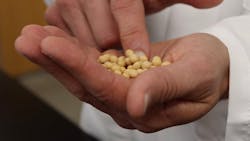Is Your Next Innovation Growing in the Field Next Door?
Ohio’s largest export is already used in biodiesel, candles, crayons, ink, animal feedstock, industrial lubricants, bio-composite building materials and more. Now, Airable Research Lab, a one-of-a-kind lab funded by the Ohio Soybean Council and housed on the campus of Ohio Wesleyan University in Delaware, Ohio, is developing even more and innovative uses that will increase market demand for soybeans.
The same little bean that provides high-quality protein also serves as a renewable, environmentally friendly alternative to petroleum. As such, soybean oil can be used in products that rejuvenate aging roofs, make flip flops more flexible, protect wood floors and keep hands cleaner and softer during cold, dry months. It’s an ideal material for use in sealants, insulation, and foam for furniture and autos.
“Most people would be surprised by the amount of consumer and industrial products that can be made with or improved by soybeans,” says Barry McGraw, Airable Lab’s chief laboratory officer. “We’ve been able to develop some interesting products that have attracted the attention of several commercial companies.”
Road Ahead
For Airable, the biggest opportunities for new soybean applications come from the industry ideas. “They’re telling us what they need and want. We don’t have to predict the best use of soybeans for commercial and industrial users,” he says. “We’re working in coordination with them to determine their technical needs for bio-based products. As we research and develop materials, they evaluate them for a specific application.”
Roof Maxx is a perfect example. It started with a couple of entrepreneurial people who had owned roofing company. “They wanted a plant-based solution to rejuvenating roofs and making them last longer,” says McGraw. “If we hadn’t have connected with them, we wouldn’t have understood that need. But instead, we were able to work with them to develop a soy-based product.”
Airable is also working with Franklin International to help develop a bio-based, pressure-sensitive adhesive. According to McGraw, it’s another opportunity that started with a company’s interest in a specific bio-based application.
Although replacing petroleum applications represents a meaningful opportunity for Airable, it also the biggest competition for soybeans. For the most part, petroleum tends to be cheaper to manufacture than bio-based materials, explains McGraw. “On top of that, petroleum has been around for 40 to 50 years. A large industry with a well-established value chain is built around petroleum,” he says. “The bio-based industry has been around for a while, too, but it still represents a relatively small percentage of chemical materials. And there’s limited manufacturing capacity. So I’d say the cost of raw materials and value chain are the two biggest obstacles for commercializing new soybean-related innovations.”
Have an Idea?
McGraw says that Airable’s goal is to work with commercial and industrial companies to research and develop new uses. “Ideally, we’d like 75% of our projects to involve a partnership with a commercial company and the other 25% to be internal R&D,” he says. “We’re eager to let companies know that we can offer free proof of principal research if they walk us through their technical needs.”
About the Author
Peter Fretty
Managing Editor
As a highly experienced journalist, Peter Fretty regularly covers advances in manufacturing, information technology, and software. He has written thousands of feature articles, cover stories, and white papers for an assortment of trade journals, business publications, and consumer magazines.
